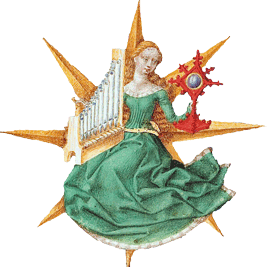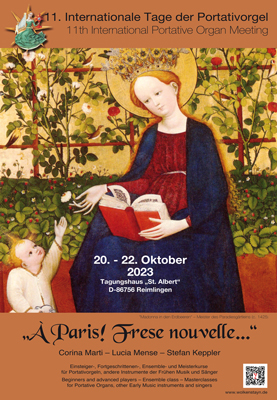
International
Portative Organ Meeting
| Course Theme 2023 | Courses 2023 | Application |
| Location | Application Info | Teachers |
| Cancellation Policy | Impressum & DSGVO |

11th Int. Portative Organ Meeting 2023
"À Paris! Frese Nouvelle"
Musik from the Middleages to the Early Modern Era
Oktober 20-22, 2023, D-86756 Reimlingen
Courses for Beginners & Advanced Players – Ensemble Class – Master Class
Corina Marti – Lucia Mense – Stefan Keppler
For Portative Organs, other Medieval and Renaissance period instruments and for singers
"A Paris, soir et matin! Frese nouvelle…."
The title is a motet from the so called Codex Montpellier.
With the repertoire of the late 13th century to traditional dance music of France, we will focus both on secular and church music around Paris.
With the courses, we follow the "Golden Thread" of the Codex Montpellier to explore many interesting, old but new pieces, tunes and melodies: for example Adam de Saint-Victor, Pygmalions' Motet, but also Valse Musette and others, Jacobus de Liège, and we will hear and learn about Hieronymus von Moravia:
Together, let's follow the spirituality and fascinating sensuality of the „Frese Nouvelle“, the French expression for "strawberry"!
| The Portative Organ or Organetto is one of the instruments most frequently found in medieval iconography. These small portable medieval organs have become quite popular again thanks to their beauty and enchanting sound. Over the past ten years, we have had the pleasure to share our insight and love for the music from the Middle Ages and the Renaissance to many professionals organists and other instrumentalists, singers, committed amateurs, and medieval music followers.The festival and the courses are intended for everyone interested in learning to play this fascinating instrument, or wanting to deepen the knowledge about. |
We work in several courses:
Beginner’s course: For people with no previous organetto experience. If you already have basic music skills and have always wanted to learn how to play the portative organ or medieaval music on other instruments, in this course we are going to teach the basic musical and technical elements, while playing popular and easy to learn melodies.
Advanced musicians will develop their skills by working in mixed and solo organetto ensembles, and will learn diverse playing and phrasing technics. We will put emphases on using the expressive resources of the instruments, while broadening our repertoire.
In the Ensemble class, we will work in mixed groups with organetto and other historic keyboards, flute, harp, fiddle, percussions and, of course, voices, to improve knowledge and playing skills, to listen to each other, to "get the ball rolling".
Those who want to continue their education in one-to-one lessons have the opportunity to take an about half-hour master class in addition to the choosen courses A-D; For this purpose, music will be sent in advance; free passive participation is possible here also.
The most important aspect will be of course, the joy of playing music all together again!
The Courses:
A Beginners
„Mouresque à Musette“ – Musical dance through the ages
Teacher: Stefan Keppler
Following traditional, also some maybe foreign-sounding melodies, quasi we dance through the centuries of historic and classic France. We will meet the works of the 16th century canon and choreographer Thoinot Arbeau, but also the amazing melodies, tunes and dances of the Breton culture, and we will attempt to trying out the spirit of classical modern French dances as Valse Musette, Cercle and Bourrée, with pleasure to discover the possibilities of the Organetto.
B Advanced
„A Paris, soir et matin“ – Frese nouvelle…On parole de batre et de vanner…
Teacher: Corina Marti
What gives the this years course of 2022 the title, is a motet from the so called Codex Montpellier.With the repertoire of the late 14th century in France but we will focus mostly on the music from Paris.
As it is so beautifully described in the motet: you find the best wine in Paris, just to mention one of the things here, and there is always something going on, both, in the morning and in the evening.
We immerse ourselves in a world of a typical student milieu, the professors, the scholars and the artists .
We’ll take a close look at the writings of Hieronymus de Moravia (Paris 1280), the ornaments, rhythm and we adapt and arrange it for portative organ and other historic keyboards.
Sacred and secular music, courtly music and of course dance music!
Midnight in Paris 1280!
C Ensemble for instruments and singers
"Music in a Mirror – The Mirror of Music"
Blindman´s Buff, Strawberries, Pride and Secret Love
Teacher: Lucia Mense
“To sing, to play the fiddle and to recite epics is recommended to everybody who has responsibility in society.” This quotation is handed down by Albertus Magnus, a german theorist and bishop who taught in Cologne and Paris – a wisdom to be recommended to (cultural) politicians of today likewise.
We are profiteers of the wise musicians from Paris also in many other aspects: Franco of Cologne (or Franco of Paris?) demanded and developed signs for the duration of sound.
The main treatise of Jacobus de Liège was named Speculum musicum: this so-called “Mirror of Music” is the most extensive music treatise extant from the middle ages. It includes the mathematically and philosophic basics of music as well as the theory of intervals, modes, musical forms – in relation to the Ars Antiqua. On the other hand Jacobus seems not to have been fond of progressive developments of the Ars Nova. Which is a shame, but human …
Other important music theorists and philosophers were Hieronymus de Moravia, Petrus de Cruce, Johannes de Grocheio etc. Some of them also seem to have been composers themselves, from others no music has been handed down to us.
But for sure our feelings, philosophical ideas, our understanding and receiving of music (and of the world) was being shaped in those times.
In this ensemble workshop we are going to follow the recommendation of Albertus Magnus und play the music from medieval Paris:
Our focus will be 2-4-voice compositions from the Montpellier Codex and the Wimpfener Fragments (Darmstadt, Hessische Landesbibliothek Hs. 3471). Their texts speak about life in the middle ages, secret love, pride, death and everyday problems and pleasures - epic stories of the Knights of the Round Table included.
We want to play the organetto together with the voice and other instruments.
Players of instruments like organetto, harp, fiddle, percussion, hümmelchen, gemshorn, recorder and traverso flute as well as singers are welcome.
“Music improves and forms the character of all men in a community. This is why everybody should keep oneself busy with learning and playing of music.” (Johannes de Grocheio: De musica, around 1300)
Masterclass
"Feast of the Masters - Masters of the feasts!"
Teacher: Corina Marti
For students interested in the personalization of their interpretation and performance. Exploring the subject in private lessons, and professionalization of individual skills; we deepen the repertoire and compose our own Intabulation: A sacred piece by Dufay.
Also, please feel free to bring your own pieces for individual training and improving your skills. Please don't hesitate to contacting the teacher in time.
Short Workshops
In addition, there will be short workshops open to all with practical and technical knowledge about the portative organ; These workshops also cover the history, origin and iconography, as well as the usage of the organetti. Practical tips and workshops such as Pythagorean Tuning and intonation skills complete the course.
Location & Time:
The event will take place in the beautiful and patriarchal, but at the same time modern and comfortably furnished conference house “St. Albert” directly in front of the gates of the historic imperial town of Nördlingen within the South German “four-city region” Würzburg-Nürnberg-Augsburg-Stuttgart.
This house has a history of over a century with an integrated own chapel which will also be available for use. All rooms are equipped with showers and bathrooms.
Start: Friday, at 6 pm with a group supper
End: Sunday, at 1pm following a group lunch.
Info & Application pdf
Deadline for registration: September, 15. The number of participants is limited. Your registration is valid upon the receipt of the course fee.
Registration please send to:
Stefan Keppler, Von-Riedheim-Weg 1
D-89359 Koetz –Germany–
spielkurs@wolkenstayn.de
If the course you have chosen is full, you will be notified. Registration confirmation including banking info for payment and further details regarding location will be sent out in time.
Terms of Cancellation / Data storage
For cancellations from September 15, the cost of the course will be charged unless the spot can be filled with another participant.
Explicitly it is advised to take a travel and course cancellation expenses insurance.
Retirement/ Cancellation of registration by the organiser
The organiser reserves his right to cancel the course holy or partial as well as changing the sequence and the content of the course; particularly by force majeure (e.g. COVID-19), illness of the teachers or less of registration. If it is necessary to cancel the course by the organiser because of the above mentioned reasons the fees will be refunded.
Data forwarding/ Graphical material/ Storage of data
Dates transferred with application will be stored and used exclusively for organisition and execution the International Portative Organ Meetings. Your dates will not be imparted to a third party.
With your registration you agree with recording and using any kind of graphical and sound material taken by the organiser.
If you don’t agree with, please note on your registration.
With your registration you acknowledge the above mentioned agreements.
–––––––––––––––––––––––––––––––––––
Organiser: Wolkenstayn Orgelbau
Stefan Keppler – Institut OrgANnos
Von-Riedheim-Weg 1, D-89359 Kötz, Germany
www.wolkenstayn.de – spielkurs@wolkenstayn.de
–––––––––––––––––––––––––––––––––––